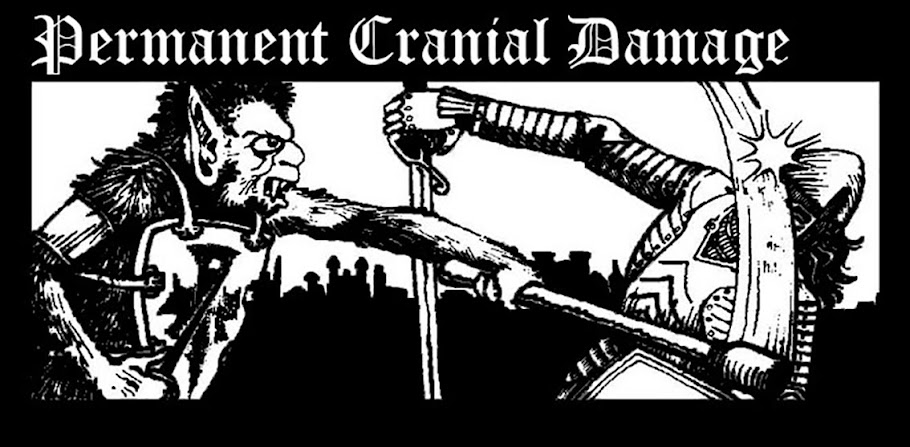Some quick notes about ways to make 5e a bit more dangerous, while not falling into OSR level lethality.
Of course, all this applies to both monsters AND PCs.
A nat 1 on a saving throw = double damage or double effect the same a way a regular critical is.
But I do want them to add more uncertainty and an element of reaction and adaptability to criticals. Particularly fails, as I want them to be much more "oshit" then just "you auto-fail".
Somewhat related, I want to make more equipment more ephemeral. Things break, require maintenance, get lost, stolen, etc. The alternate inventory system I use goes a fair way towards this, but I think we can make it go a little further.
Alexis provides a starting point:
"For a long time I've been playing a house rule that a 1 on a d20 'to hit' was a dropped weapon...An ordinary, crummy weapon, I reasoned, would break 1 in 6 upon dropping. A 'hard-forged' weapon would break on a 1 in 8. A 'blessed' weapon, one that had been hard-forged and both lucky and loved in its construction, would break on a 1 in 12. And a 'mastercrafted' weapon would be the kind made by an artist ... and it would break on a 1 in 20."
I like it, but there's too many numbers, let's simplify it.
Cheap/shoddy: 1 in d4. Normal: 1 in d8. Masterwork: 1 in d12.
This should apply to spellcasting foci and components as well.
It's interesting that this rule "reflect[s] the value of cheap weapons vs. really valuable weapons, those which didn't happen to be magic" which gives more impetus to Gold as XP.
So the inversion of this on critical hits, is armour.
A critical hit removes AC down 1 till we reach natural AC (10+dex mod). After which a critical hit forces a roll on lingering injuries. If using a shield, deduct AC from shields first.
Cheap/shoddy armour/shields: remove twice as much AC. Masterwork: takes two critical hits to remove a point of AC.
Prices for this follow the same formula: half-price for cheap, double price for masterwork.
Of course, all this applies to both monsters AND PCs.
Critical Fails on Saves
This is very risky. I love it.A nat 1 on a saving throw = double damage or double effect the same a way a regular critical is.
Critical Hit & Fail effects
Critical Hit & Fail tables are really fun. I hate them. They're too fiddly and slow down play. Most also do rob players of tactical agency in sometimes unfun ways. Decks are fun but we play online and I don't really like roll20's deck feature; I might come around to it, we'll see. 5e went a long way to making criticals simple and effective: no more confirm critical bullshit.But I do want them to add more uncertainty and an element of reaction and adaptability to criticals. Particularly fails, as I want them to be much more "oshit" then just "you auto-fail".
Somewhat related, I want to make more equipment more ephemeral. Things break, require maintenance, get lost, stolen, etc. The alternate inventory system I use goes a fair way towards this, but I think we can make it go a little further.
Alexis provides a starting point:
"For a long time I've been playing a house rule that a 1 on a d20 'to hit' was a dropped weapon...An ordinary, crummy weapon, I reasoned, would break 1 in 6 upon dropping. A 'hard-forged' weapon would break on a 1 in 8. A 'blessed' weapon, one that had been hard-forged and both lucky and loved in its construction, would break on a 1 in 12. And a 'mastercrafted' weapon would be the kind made by an artist ... and it would break on a 1 in 20."
I like it, but there's too many numbers, let's simplify it.
Cheap/shoddy: 1 in d4. Normal: 1 in d8. Masterwork: 1 in d12.
This should apply to spellcasting foci and components as well.
It's interesting that this rule "reflect[s] the value of cheap weapons vs. really valuable weapons, those which didn't happen to be magic" which gives more impetus to Gold as XP.
So the inversion of this on critical hits, is armour.
A critical hit removes AC down 1 till we reach natural AC (10+dex mod). After which a critical hit forces a roll on lingering injuries. If using a shield, deduct AC from shields first.
Cheap/shoddy armour/shields: remove twice as much AC. Masterwork: takes two critical hits to remove a point of AC.
Prices for this follow the same formula: half-price for cheap, double price for masterwork.


.jpg/800px-Songs_of_Innocence_and_of_Experience%2C_copy_Y%2C_1825%2C_object_54%2C_The_Voice_of_the_Ancient_Bard_(Metropolitan_Museum_of_Art).jpg)